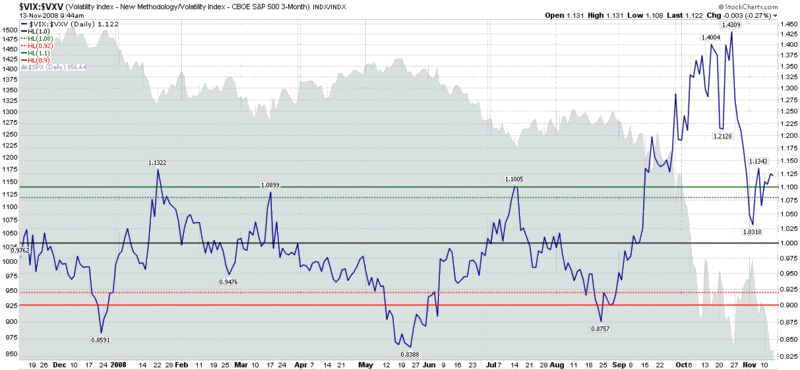VXV Is One Year Old
One year ago the CBOE launched the VXV, which is a variant of the VIX that calculates implied volatility in SPX options over the course of the next 93 days instead of the 30 day time window used by the VIX.
In December 2007, with the VXV less than one month old, I went out on a limb and suggested in The VIX:VXV Ratio that comparing the relative levels in the VIX and VXV might serve as an important market timing signal in a way that is analogous to VIX term structure data.
Much to my delight, from November 2007 through the Lehman Brothers bankruptcy in September 2008, the VIX:VXV ratio performed nearly flawlessly, generating timely buy and sell signals. In a post-Lehman world, however, the VIX:VXV ratio has struggled with a bullish bias as the markets have headed down.
In the chart below I present my original thinking from December 2007 of how the VIX:VXV might be applied. Since that time, I have made a number of enhancements for my personal use that I have yet to post about on the blog. A couple of those enhancements now suggest that the pre-Lehman threshold levels such as 1.10 and 0.90 are once again relevant. This would make the current VIX:VXV ratio of 1.12 an excellent buying opportunity.
For a long time, I was the only person who talked about the VIX:VXV ratio. Over the course of the past year, however, it has generated a strong following. Now that readers have a year of data to digest and a broad range of market conditions in which to evaluate the indicator, what enhancements or modifications to the VIX:VXV ratio would you suggest? Feel free to discuss this in the comments section below.

[source: StockCharts]


11 comments:
For the record, Condor Options had a interesting post about the VIX:VXV ratio yesterday: Testing the VIX:VXV Ratio
by the wyckoff method, thus far we seem to have low enough volume across the board in the indexes compared to 10/10, so if we 'spring' above 840 SPX to close a buy signal is generated...NDX RUT NYA need to all close above 10/10 lows also or there would be a troubling divergence
-deac
The Wyckoff Method buy signal was generated as the SPX closed at 911, the NDX at 1211, the RUT at 491 and the NYA at 5716. These indexes increased by 11.2%, 9.1%, 13.4% and 11.3% in the last three hours of trading. A key reversal day from the triple bottom intraday SPX lows of 10/10, 10/24 and 10/27 appears to have occurred today. Also, the cash VIX index closed down 10.0% and closed 17.0% below its intraday high level of 69.99. What other technical indicators, insight and/or variables can the professional traders that review this website offer to confirm that today was a bullish key reversal day?
Bill, I'm curious about your adjustments but here's my simple rule. Disregard VIX/VXV ratio when it goes into "uncharted territory" (eg. all-time closing high). Resume trading with a stop loss when the VIX/VXV value re-enters 1.10-0.9 range.
Henry
Anon, it is tough for me to think about confirmation until I see how the next few days develop.
Henry, that was my initial thinking about how to handle the extreme values -- and I still think there is some validity to that approach.
Cheers,
-Bill
Nice. Bright minds think alike!
Bill I was wondering if you've ever investigated looking at the expected returns for sets of standardized options strategies rather than market direction in particular.
For instance, I've made a killing off the VIX:VXV ratio being so large. I've just picked some very out of the money options to do a diagonal calendar bull/bear spreads. I got into one bull spread where I calculated that the huge front month volatility meant that the market would have to drop all the way to 650 before I was down.
What was odd to me was that the IV differences were a lot less pronounced in small caps and commodities than the S&P.
Have you ever looked into the predictive nature of the front month vs longest month VIX futures ratio?
I'd imagine it would tell a similar story to the vix/vxv.
Regarding key reversal days, Cobra's Market View spells out the components of such days as identified by Don Worden of TeleChart: Worden on key reversal days
JK, I believe you are correct, but I would like to see some more data before I would sign off on that one.
Mikkel, that is an interesting observation about the S&P. Regarding the testing of options strategies, I would love to do more research on that one, but for now at least I am very much limited by an absence of appropriate historical data.
Cheers,
-Bill
hi,
i am from india and a great fan of your insights.
my two pennys are if u convert your $vix:$vxv into "weekly" mode and act contrarian on readings above 1.3 and below 0.7 , the timing will be near perfect...
corrections to my observations are most welcome
regards,
Thanks for your suggestions, Himanshu. While I like your suggestions, they still have the drawback (shared by almost all VIX:VXV systems) of pushing a trader into a long position just as the 2008 disaster was unfolding.
Cheers,
-Bill
Post a Comment